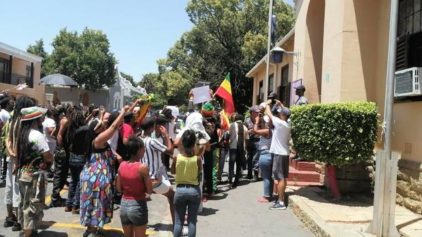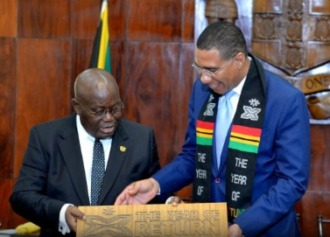Through poetic expressions, chants, and regurgitated speeches from revered icons of the Rastafarian faith, it was sheer jubilation from the Rastafari community when the National Museum of Jamaica, formerly the Institute of Jamaica, opened its first Rastafari exhibition in downtown Kingston yesterday.
As reported by Jamaica-gleaner.com:
“According to the Rastafari Millennium Council, it is intended to be an exhibition that will reveal the character of one of the world’s most significant liberation movements – the Rastafari movement.
“The exhibition showcased several aspects of the Rastafarian way of life, such as their attire, furniture, food, housing and language.
“In January, the National Museum called for members of the public to supply materials used by Rastafarians in order to mount the exhibition.
“Yesterday, Jonathan Greenland, director of the National Museum, said the exhibits were the results of years of lobbying work.
“‘We had to do a lot of community negotiations, both from an individual level and also on a large scale. We were able to meet with the elders of the different communities (of Rastafari) all over Jamaica. It’s based on constant negotiations from individuals,’ Greenland said.”
Rasta Movement’s Growing Appeal in Jamaica
According to Atlantablackstar.com:
“The Rastafarian faith is indeed rising in Jamaica, where new census figures show a roughly 20 percent increase in the number of adherents over a decade, to more than 29,000. While still a tiny sliver of the mostly Christian country’s 2.7 million people, Jalani Niaah, an expert in the Rastafari movement, says the number is more like 8 to 10 percent of the population, since many Rastas disdain nearly all government initiatives and not all would have spoken to census-takers.
“‘Its contemporary appeal is particularly fascinating to young men, especially in the absence of alternative sources for their development,’ said Niaah, a lecturer at the University of the West Indies.
“Founded 80 years ago by descendants of African slaves, the Rasta movement’s growing appeal is attributable to its rejection of Western materialism, the scarcity of opportunities for young men in Jamaica and an increasing acceptance of it.
“For the black nationalist Bobo Ashanti commune, the Rastafarian faith is a transforming way of life, where Rastas strive to live a frugal existence uncomplicated by binding relationships to ‘Babylon’ — the unflattering term for the Western world.”


